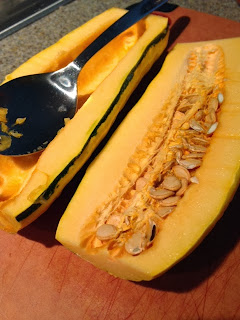The beautiful sunny weather finally disappeared here in
Portland, so to brighten my day I decided to make a warm fall recipe. And OMG!
Yum! I roasted delicata squash and the seeds to boot. What I ended up with was
a nutritious side dish that could be a great addition to any Thanksgiving
smorgasbord. The dish is naturally low in calories and rich in nutrients, while the cayenne pepper will help boost your metabolism as you take part in the holiday feasting! The addition of the seeds
gave it a nice crunch too. Bon Appetite!
Sweet & Spicy
Delicata Squash with Roasted Seeds
Ingredients
- 2 delicata squash
- ¼ cup orange juice
- 1 Tbsp avocado oil
- 1 Tbsp honey + more for drizzling
- ¼ tsp cayenne pepper
- salt to taste
For the seeds:
- sprinkling of cayenne, paprika and salt (you can choose to just do salt, but the paprika gives the seeds a beautiful color and the cayenne gives them an extra kick!)
Preparation
Instructions
- Pre-heat oven to 375 degrees F.
- Cut squash in half lengthwise and spoon out the seeds. Set the seeds aside for roasting.
- Cut halves into ¼” slices making c-shaped pieces.
- Mix together OJ, oil, honey and cayenne pepper.
- Toss squash with mixture and spread in a baking pan.
- Bake for 30 minutes. Salt to taste after baking if desired.
Roasting Seeds
- Separate ¼ cup of seeds from excess squash, like you would with those from a pumpkin and spread on a baking sheet.
- Sprinkle with cayenne, paprika and salt.
- Roast in the oven at 375 degrees F for about 12 minutes. (You can put the seeds in 12 minutes before the squash are finished roasting and pull everything out at the same time).

Serving
Instructions
- Portion out four ¾-cup servings.
- Drizzle each serving with honey and top with 1 Tbsp roasted seeds.
- Serve warm.
Fuel Facts
Numbers: 100 calories, 3 g protein, 6 g fat, 26 g carbs, 3 g
fiber
**For ¼ of
the recipe (~3/4 cup roasted squash and 1 Tbsp roasted seeds)
Ingredient Breakdown:
v
Winter
Squash – Varieties of winter squash include delicata and acorn. Winter
squash are one of the top food sources of carotenoids, antioxidants that
promote eye health and boost the immune system. One cup of winter squash also
provides about one-third of the recommended daily intake of vitamin C. Delicata
squash have a thin skin that can be eaten when cooked, making it easy to
prepare and enjoy.
v
Oranges –
You probably associate oranges for their high content of vitamin C, with just
one cup of orange juice providing more than the daily value of this beneficial
nutrient. But why exactly is vitamin C so important to our health? For starters
the body can’t make or store vitamin C, therefore we must get it daily in our
diet to prevent deficiency.
Vitamin C is needed for a variety
of functions including carnitine synthesis, a substance that helps convert fat
into energy, and collagen synthesis, a material in the body that plays a role
in the sturctual integrity of blood vessels, ligaments and bones. It is also
important in norepinephrine production, a neurotransmitter that affects mood.
v
Avocado Oil
– This is a fantastic oil to use for roasting or cooking at high
temperatures. Avocado oil has a smoke
point of 500 degrees F, higher than most other oils. Due to this, the oil will
withstand chemical transformations that can occur when an oil reaches its smoke
point, changing a once healthy oil into one that is full of trans fats. It is
important to note that virgin avocado oils, as all oil that have not been
filtered or refined, have lower smoke points, so make sure you are buying 100%
pure avocado oil.
v
Honey –
Due to the combination of glucose and fructose, honey will keep you energized
longer than it’s sweet counterparts. Glucose is used quickly by the body,
providing an immediate energy source. Fructose takes longer to absorb, sustaining
blood sugar levels. When blood sugar is kept stable, your energy will also
remain constant, so say goodbye to the afternoon crash.
Honey is also a great natural healer. For
starters it is packed with polyphenols, antioxidants that have immune boosting
properties to keep you from becoming sick. In addition, honey contains an
enzyme that produces hydrogen peroxide which is why it is believed to be
antibacterial in nature. Honey can be used topically to treat burns, wounds,
and even acne. Honey fights off impurity-causing bacteria while also hydrating
the skin.
v
Cayenne
Pepper – Cayenne peppers, a member of the chili pepper family, get their
spicy kick from a compound called capsaicin. The hotter the pepper, the more of
the compound it contains. Capsaicin has been studied extensively and is found
to have an anti-inflammartory effect, which makes cayenne a great addition to
recipes and even recovery smoothies after a hard workout.





No comments:
Post a Comment